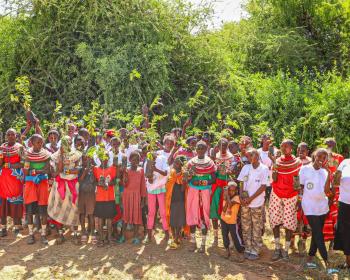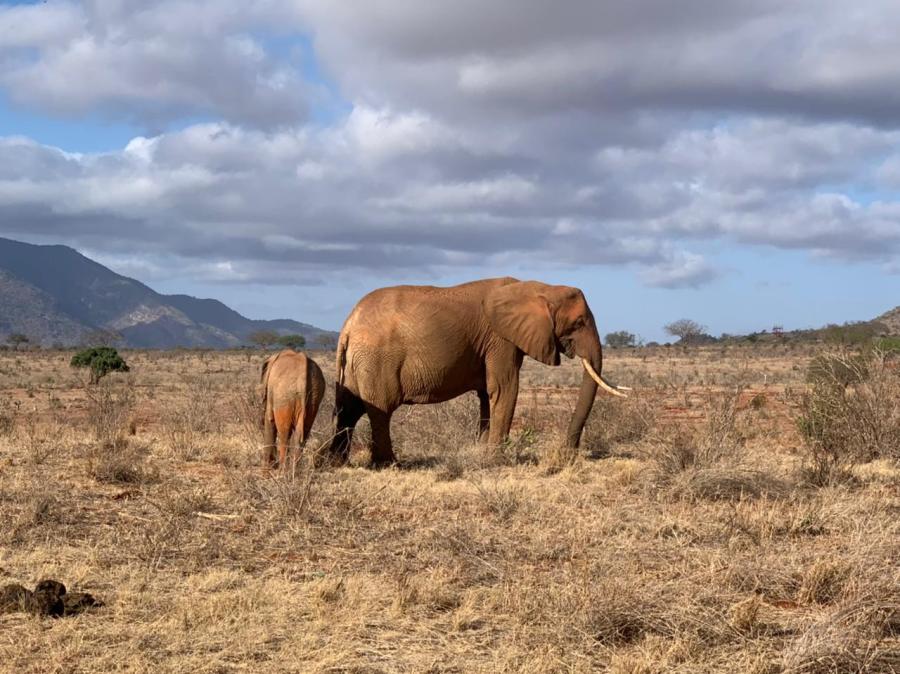
By Xiting Tong (CS Intern)
Under the sprawling branches of ancient trees by Lake Bogoria, Elders and young people sat together. The Elders, whose faces bore the gentle lines of time, shared stories with the young generation. Their voices, though quiet, carried the weight of many years of Indigenous wisdom and experience. “I have come to learn that there are many Elders who have a lot of stories to tell, and we have to reach them through this project,” says Rodgers Kibet (Endorois), a youth from Mochongoi.
The Endorois are Indigenous Peoples residing near Lake Bogoria, Mochongoi Ol-Arabel, and the Marmanet Forest, located in the Marigat and Mogotio sub-counties of Baringo County, as well as in Nakuru and Laikipia Counties within Kenya's Rift Valley. They are pastoralists who have historically lived around Lake Bogoria and view the Mochongoi Forest and Lake Bogoria as sacred areas. According to the 2019 Census, they number more than 45,000.
In 1973, the Kenyan government forcibly displaced the Endorois to create the Lake Bogoria National Reserve without prior consultation or consent: a direct violation of their rights. This history, compounded by the harsh effects of climate change, has threatened the Endorois Peoples’ physical, spiritual, and cultural livelihood. They have also been under increased pressure from government agencies to move away from the agro-pastoralist lifestyle to a mono-cash crop farming system. As a result of these significant changes, the Indigenous practices and knowledge of the Endorois Peoples is at monumental risk.
Endorois youth with an Elder in the field.
In the absence of traditional practices and amid the adoption of new agricultural techniques, there has been an increase in nutrition-related lifestyle diseases that have reduced life expectancy; the average life expectancy, once beyond 100 years old, is now under 70. Indigenous knowledge systems are held amongst the Elders, but in the last two decades, the community has witnessed a rapid loss of Elders, and with them, a loss of cultural heritage. The displacement of the people and the erosion of their cultural heritage has created generational trauma and intensified the loss of irreplaceable Elders, culture, and language, threatening an eradication of identity. Without urgent and coordinated efforts, the Endorois people face the threat of complete extinction of culture, language, and Indigenous knowledge, which traces back many millennia to the original roots of humanity on the African continent.
Since 2018, the Jamii Asilia Centre (JAC), founded to protect and promote the rights of Indigenous Peoples in Kenya through sustainable and culturally relevant development, has conducted a series of 10 direct consultations with Endorois youth, Elders, and key influential figures. In these consultations, individuals have expressed a unanimous desire to return to their cultural lifeways. They want the Elders to be empowered again to guide the Endorois society and believe that their livelihoods would dramatically improve if the ecological knowledge systems held by the Elders are protected and prioritized.
The Revitalize the Roots Initiative, created by Global Wisdom Collective, seeks to protect vital lifeways and Traditional Knowledge alongside and for Indigenous Peoples to safeguard sacred ecological practices and culture for generations to come. The organization works in council with the youth, Elders, and wisdom keepers of each community to protect oral stories that we cannot afford to lose. The organization prioritizes intergenerational knowledge-sharing programs to achieve this goal, and in 2021, joined together with the Jamii Asilia Centre in a joint mission for the Endorois Peoples called Revitalize the Roots: Bikaptorois.
The project, supported by a Keepers of the Earth Fund grant, focuses on the audiovisual preservation of 400 years of the cultural heritage of the Indigenous Endorois Elders of Kenya through recorded intergenerational knowledge-sharing. Forty Endorois youth were provided with structured training, mentorship, programming, and digital resources to record and protect the Indigenous ecological knowledge systems of 20 Endorois elders between the ages of 60-100 in the Nakuru, Lake Bogoria, and Mochongoi area—Elders who are the bastions of the Endorois Peoples’ cultural heritage. The recordings were uploaded to a digital repository accessible to all Endorois people.
Indigenous knowledge systems that were recorded in this project include ancient practices of pastoralism, totem methodology, medicine, song and dance, Endorois spirituality, and lifeways that sustain ecological biodiversity based on pastoralist traditions. The Endorois Peoples’ sacred medicine system is another high priority for preservation. The system is inextricable from the survival and medicinal value of the forest and grasslands; however, only a few Elders remember this knowledge today. Other examples of Endorois practices include systems of ceremonial dress surrounding the sacred code for Indigenous Endorois cattle care, beekeeping, flamingo song, and dances to prepare the land for harvest and rain. The Endorois clans’ totem system is also essential in preserving nature, which describes how the clans are sacredly interlinked based on the galaxy and the balance of flora and fauna. In addition, the preservation and transmission of the Endorois language is the core component of the Indigenous Knowledge systems. The totality of the intergenerational recordings is preserved in Torois, the language of the Endorois people.
Endorois dancers.
Most importantly, the project focuses on the training of the younger generation and facilitating intergenerational dialogues. The youth received training in cultural, communication, and leadership skills and question formatting. The project staff also trained the youth in how to record audiovisual storytelling, upload digital files, and access records. Young people were paired with Elders throughout the project to attend to the Elders’ needs. Now, Endorois youth can continue the traditions of their Elders and rebuild the practices of what was lost and destroyed, and their once-endangered culture has been safeguarded through the creation of digital records and over 500 hours of intergenerational recordings.
Endorois youth with Elders.
As stewards of the land for over 500 years, Endorois Peoples’ ecological knowledge mitigates humanity and the planet’s most urgent issue: climate change. Examples include early warning signs on disaster risk management, pastoralist livelihoods on ecological biodiversity restoration, and conservation. Lake Bogoria is a registered UNESCO World Heritage site and the land is home to some of the richest biodiversity in Kenya. According to the UN Environment Programme, Lake Bogoria holds valuable microbes and microorganisms that may serve as the basis of crucial biotechnology and solutions globally. In order for this to be of benefit, the lake must stay ecologically stable, which it has been under the Endorois Peoples’ stewardship. With urgent and coordinated preservation efforts, the preservation of Endorois Indigenous Knowledge systems will not only protect Endorois identity, but also rebalance the ecological biodiversity of Lake Bogoria, addressing the urgent issue of climate change.
The Revitalize the Roots: Bikaptorois project is the first, and, to date, largest scale cultural preservation project of its kind for the Endorois People. This project will create sustainable resources and community momentum to record and apply Endorois knowledge systems, and it has been widely accepted and received within the community. “It is a very important project to our people since its introduction since it aims at recording and keeping the history and culture of the community that could have been lost,” says Faith Kimaru, one of the youth participants of the project.
In 2023, the Jamii Asilia Centre (JAC) received a Keeper of the Earth Fund grant to support their work. KOEF is an Indigenous-led fund within Cultural Survival designed to support the advocacy and community development projects of Indigenous Peoples. Since 2017, KOEF has funded 310 projects in 41 countries through small grants totaling $1,603,307, as well as provided technical assistance benefiting 328 Indigenous Peoples. KOEF provides grassroots Indigenous-led communities, organizations, and traditional governments to support their self-determined development projects based on their Indigenous values. Predicated on the United Nations Declaration on the Rights of Indigenous Peoples, Cultural Survival uses a rights-based approach in our grantmaking strategies to support Indigenous grassroots solutions through the equitable distribution of resources to Indigenous communities.
Top photo: Endorois youth adorning an Endorois Elders Council member.


